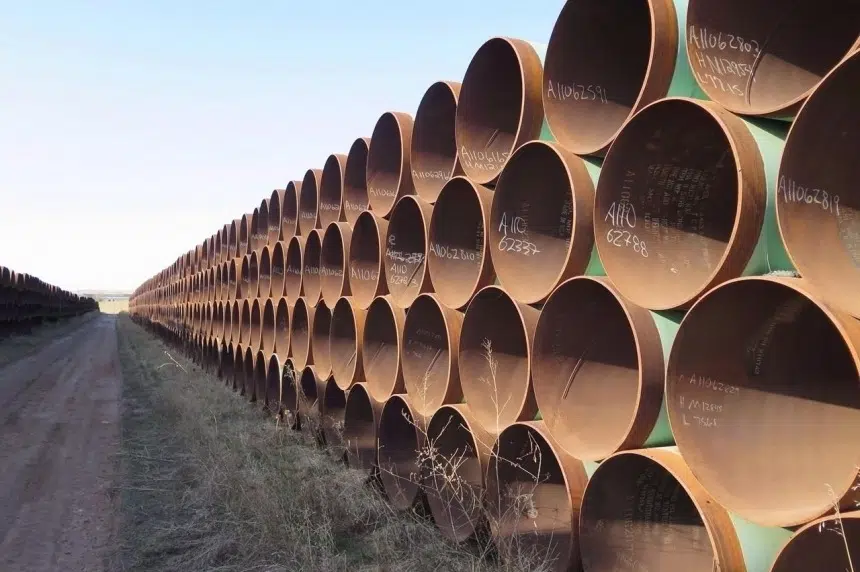OTTAWA — The Federal Court of Appeal has dismissed legal objections to Ottawa’s decision to approve the Trans Mountain pipeline expansion a second time.
In a 3-0 decision, the court rejected four challenges from First Nations in British Columbia to the approval, which were filed last summer. The 95-page ruling says there is no legal basis to interfere with the federal cabinet’s approval of the project.
That means construction can continue on the project, though the First Nations have 60 days to appeal to the Supreme Court.
Natural Resources Minister Seamus O’Regan said the government welcomes the ruling and believes it proves that if consultations and reviews are done properly, major projects can be built in Canada.
“This has worked out well,” he said.
“The courts have acknowledged that we listened and that we want to do things right.”
Chief Lee Spahan of the Coldwater Indian Band said in a statement an appeal to the Supreme Court is under consideration. He also said his band must still be consulted on the route the expansion will take, with the approved route passing an aquifer that is the only source of drinking water for 320 people living on the main Coldwater reserve.
The band wants the route moved away from the aquifer.
The cabinet originally approved the expansion project, to twin the existing pipeline, in November 2016. Prime Minister Justin Trudeau said at the time it was in Canada’s national interest to build the project, which will provide oilsands producers more transportation capacity to get their products to market.
That approval was overturned by the Federal Court of Appeal in August 2018, citing an insufficient consultation process with Indigenous communities and a failure to properly take into account the potential impact on marine life from additional oil tankers off the B.C. coast. Ottawa then launched another round of consultations with Indigenous communities and asked the National Energy Board to look at marine life.
In June 2019, cabinet issued its second approval for the project. Following that, the Coldwater Indian Band, Squamish Nation, Tsleil-Waututh and a group of small First Nations in the Fraser Valley asked the court to review the decision a second time. The court refused to hear a challenge from environment groups seeking a review of the decision on environmental grounds but agreed to go ahead with the First Nations case.
In a December hearing, lawyers for the bands argued the government went into the new consultations having predetermined the outcome.
But the judges said “this was anything but a rubber-stamping exercise.”
“The end result was not a ratification of the earlier approval, but an approval with amended conditions flowing directly from the renewed consultations,” the ruling said.
The judges found the government made a genuine effort, listened to and considered concerns raised by First Nations, and sometimes agreed to accommodate those concerns, “all very much consistent with the concepts of reconciliation and the honour of the Crown.”
They also say while it is true not all the concerns raised were accommodated, “to insist on that happening is to impose a standard of perfect,” that is not required by law.
“We particularly appreciate the clarity in the decision that the duty to consult does not equal a veto,” Alberta Premier Jason Kenney said in a statement. He said most Canadians and most First Nations “want to share in the economic benefits of responsible resource development” and “it’s time to get this pipeline built.”
O’Regan acknowledged there will be people unhappy with the court’s judgment and any outstanding concerns they have will not be ignored.
“I want to say clearly to those who are disappointed with today’s court decision: we see you and we hear you,” he said. “As construction continues to move forward we will take every step that we can to ensure that this project moves forward in the right way.”
The expansion project would triple the capacity of the existing pipeline between Edmonton and a shipping terminal in Burnaby, B.C., with the new pipeline carrying mainly diluted bitumen for export.
It has become a political challenge for Trudeau as he insists Canada can continue to expand oil production and still meet its commitments to cut greenhouse gas emissions.
Trudeau’s government bought the existing pipeline and the expansion plan in 2018 after political opposition to the project from the B.C. government caused Kinder Morgan Canada to pull out from building the expansion. The government intends to finish the expansion and then sell both the existing pipeline and the expansion back to the private sector.
It has been in talks with some Indigenous communities about the sale but Finance Minister Bill Morneau has said the project won’t be sold until all the risks about proceeding are eliminated. Those risks include this court case.
Morneau said Tuesday the government still expects about $500 million in revenues each year once the pipeline is up and running, all of which will be put towards clean technology and energy projects.
Mia Rabson, The Canadian Press







